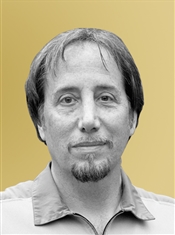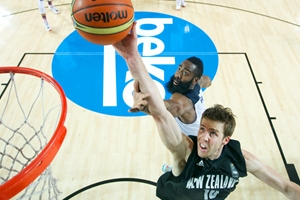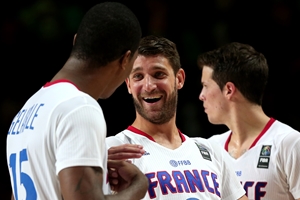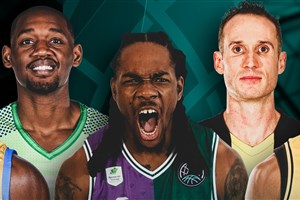
NWBA gets top pick for front office
Charlotte (Steve Goldberg's Wheel World) - If executives were selected the same way that, let's say, NBA players are, Jim Scherr would be a top overall draft pick. You know, like LeBron James or Yao Ming or Anthony Davis.
And the National Wheelchair Basketball Association (NWBA) would be the team that won the lottery. The former CEO of the United States Olympic Committee (USOC) has signed on as the interim executive director for the NWBA.
The timing couldn't be better. As the oldest and longest standing sport specific governing body in American Paralympic consortium, with a nationwide footprint and thousands of registered athletes, representing the game of basketball which now rivals soccer for global popularity, the NWBA is positioned to make significant strides as the USA and the rest of the world gear up for Rio 2016.
Though the NWBA is only three years younger than the NBA, Paralympic sport in the U.S. has lagged behind its Olympic counterparts in developing national governing bodies (NGB's) that parallel the professional, structured, well-funded organizations necessary to compete on a global stage.
Some big Paralympic sports such as athletics and swimming are managed by US Paralympics which is part of the USOC while a few like tennis and hockey are integrated with the NGB's that oversee the Olympic sides as well.
Wheelchair basketball around the world is mixed on this as well. For instance Basketball Australia oversees both Olympic and Paralympic teams while Wheelchair Basketball Canada is independent.
So is the NWBA, which has both positive and negative aspects to it. A historical strong point has been the passionate and dedicated network of volunteers that have seen the game maintain for over half a century. A downside is that the organization, based in a country where the government does not finance sport, has to be self-sufficient in a very competitive environment for generating revenue and funding to support its domestic and international development and competition agendas.
To the NWBA, Scherr is the All-American player - and LeBron would have been had he gone to college - the one who can open up the game and take a team to the next level.

Jim Scherr and his twin brother Bill (top row, second from right and left) represented the USA as wrestlers at the 1988 Olympic Games in Seoul, Korea. Photo courtesy of South Dakota Sports Hall of Fame.
Scherr literally was an All-American in wrestling at the University of Nebraska where he won the NCAA 177-pound title in 1984. He took that success to the international level with two world championship silver medals and one bronze. He, along with his twin brother Bill, competed for the U.S. at the 1988 Seoul Olympic Games where he finished fifth in the freestyle wrestling 90 kg class.
Two years later he was in charge of USA Wrestling and led that organization for a decade until joining the USOC as director of high performance in 2000. In 2003, he was asked to take charge of the entire USOC which had been unsettled by a quick succession of leadership changes and scandal regarding the awarding of the 2002 Winter Games to Salt Lake. He was the first, and to this point only, former Olympian to lead the organization.
That also began as an "interim" job yet Scherr saw the USOC through three Olympics - Athens, Torino and Beijing - where the USA won 236 medals. More importantly, he brought stability to the organization over his six years at the helm, which also included the further integration of Paralympians and the establishment of US Paralympics as part of the USOC. He resigned the position in 2009.
While winning medals in Rio is important to the NWBA - the men made the podium in London for the first time since Sydney, while the women look to regain their gold stature of 2004 and 2008 after finishing fourth in London - Scherr's task is helping the organization prepare for a much longer look at the future.
That's what excited NWBA President Sarah Castle when the opportunity arose to bring Scherr aboard. A game-faced gold medal winner with the USA women in Beijing, Castle doesn't mess around. Her day job now is as an Assistant Prosecuting Attorney in Kansas City, Missouri. When Scherr's hiring was announced, she told me that this was a significant action and opportunity for the NWBA.
The connection came through NWBA Vice-President and Board of Directors member Bruce Fischbach, the Assistant Athletic Director for Sports Medicine at the University of South Dakota, who knew Scherr from their time together at Nebraska where Fischbach worked as a student trainer in the athletic department.
Now that he's a couple of months into the job, I spoke with Scherr about his new position.
Driving home to Colorado from Texas where his teenage daughter was competing in a soccer tournament just before the American Thanksgiving holiday, Scherr told me he was intrigued by the challenge and impressed by the passion for the sport.
He recounted his impressions from the first wheelchair basketball game he saw at the Athens Paralympics in 2004: "My takeaway was that it was a faster and higher quality of basketball and more contact than I would have imagined had I not seen it."
When asked about priorities, Scherr said that he would like to enhance how the board operates, continue building professional staff, building better awareness and understanding of the NWBA story and mission in the private donor market (which has been very critical to the growth of the USOC) as well as the corporate sponsor arena to grow resources.
"Three other areas of distinct opportunity are to grow our programming at the collegiate level, grow programming at the youth level, and to grow programming affecting Operation Rebound which provides opportunities for disabled veterans to experience the sport, where hopefully some of them matriculate into the high performance program."
Along with that he's looking at the peripheral but necessary aspects of marketing and sponsorship, external and internal communications, and tournament event production, among other areas that he well knows have to be part of a successful sports organization.
It's still early and there's much to be done but for Castle, Fischbach, the other directors and membership of the NWBA, they must feel the same optimism that the Cleveland did in 2003 when David Stern put a Cavaliers hat on the head of LeBron James.
Steve Goldberg
FIBA
FIBA's columnists write on a wide range of topics relating to basketball that are of interest to them. The opinions they express are their own and in no way reflect those of FIBA.
FIBA takes no responsibility and gives no guarantees, warranties or representations, implied or otherwise, for the content or accuracy of the content and opinion expressed in the above article.
To help make this column as inclusive as possible, please send any national or international event information, story suggestions, or comments to wheelworldmail@gmail.com.

















